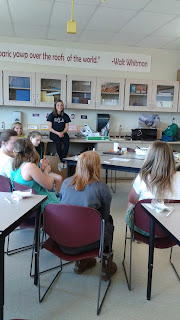Part of the mission
statement of our company is to educate. In today's world when there is so much
fear of chemistry I love the opportunity to help educate youth about
opportunities in chemistry. Yesterday I participated in a presentation for a GEMS group; Girls in
Engineering, Math and Science. The day was sponsored by a local high school
leadership group and invitations were sent to middle school girls. There were 4
presenters and the girls circulated through the 4 classrooms for presentations.
It seemed like the main theme and interest was robotics so cosmetic chemistry was a little
different - its nice to let girls know how chemistry applies to their everyday
life.
We made bath fizzies and talked about the chemical reaction involved between the sodium bicarbonate (baking soda) and citric acid. In case you are interested, the equation is below:
NaHCO3 + C6H8O7 → CO2 + H2O
+ Na3C6H5O7
The reaction between an acid (citric
acid) and a base (sodium bicarbonate) yields a salt and water; in this case
trisodium citrate and water. In this particular reaction, one of the products
is also carbon dioxide which is a gas released and is what produces the
fizziness in the bath.
Here is the bath fizzy formula we used:
1 cup baking soda
1/3 cup citric acid
1.5 ounce kokum butter (melted)
0.5 ounce rice bran oil (infused with
horehound)
6 ml fragrance oil
Melt butter, mix with other ingredients and mold into a muffin
tin. Let set for awhile so the butter hardens.
Another important thing we
talked about was how to pronounce ingredients in an attempt to discredit the
misnomer that 'if you can't pronounce it then its toxic'. I want girls to be smart enough to expand their vocabulary rather than be intimidated by new words and assume things are toxic just because they've never heard of them. We went over the
ingredient list for their bath truffles to make sure they could pronounce
everything.
Sodium bicarbonate, Garcinia
indica (Kokum) Butter, Citric Acid, Oryza Sativa (Rice Bran) Oil, Marrubium
Vulgare (Horehound) Extract, Fragrance.
I ended up having some time
left over, so next year I'll talk more about what a cosmetic chemist does on a
day to day basis. I hope I stimulated at least some interest in chemistry. Have you ever taught young students about what you do?
